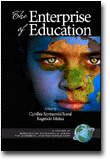
The Enterprise of Education
Edited by:
Kagendo Mutua, University of Alabama
Cynthia S Sunal, University of Alabama
A volume in the series: Research on Education in Africa, the Caribbean, and the Middle East. Editor(s): Cynthia S Sunal, University of Alabama. Oluseyi Matthew Odebiyi, Arizona State University. Kagendo Mutua, University of Alabama.
Published 2007
The Enterprise of Education is Book IV of the research series, Research on Education in Africa, the Caribbean and the Middle East. This book examines the implications of rapid political, sociocultural, and economic change for the enterprise of education within particular countries in the regions of Africa, the Caribbean, and the Middle East—all of which have cultural ties. It provides a space for a critical dialogue about the impact of global issues on the enterprise of education in specific locales or regions within a specific country. Finally, the book identifies trends in the enterprise of education that are occurring across the regions.
The Enterprise of Education draws from recent research, summarizing, interpreting, and making connections to address issues/questions that are central to the enterprise of education today in these three world regions. Among the specific questions/issues that are considered include the following: How is the enterprise of education addressing and including the needs of all children including those who are squatters, new immigrants, have special education needs, and who are voiceless in their society? What social structures in these regions mitigate against student learning, especially particular groups of students? What research methodologies enable us to investigate the enterprise of education in these world regions? What role does the learning environment play in schools? Who creates curriculum, and for what purposes? Which issues are found to a greater or lesser extent in education in other world regions? What role do parents play, in economic and social support of schools? How can teachers best be prepared for effective teaching?
CONTENTS
The Enterprise of Education in Africa, the Caribbean, and the Middle East: Reports from the Field, Cynthia Sunal and Kagendo Mutua. Inclusive Education for Inclusive Development in Lesotho: Case of Students with Cognitive Disabilities, Christopher Johnstone. Attitudes of Families toward their Teenaged School Dropouts and the Impact on the Teenagers in Ghana, Cecilia S. Obeng. School improvement—It Is Achievable: A Case Study from a South African School, Petros Pashiardis and Jan Heystek. Research and Practice in Education: Reflections and Hope to Voiceless Constituents in Kenyan Educational System, Mwarumba Mwavita. Reaching Educational Quality Goals in Sub-Saharan Africa: A Look at Complementary Education Systems, Leslie Casely-Hayford. Enterprise and Epistemology in the Materials of African Education: The Post-Colonial Dilemma of Culture, Text, and Technology, David S. McCurry. Evaluating the impact of the “Learning for Living” Project on the Development of the Literacy Skills of Learners in Low-Income Communities in South Africa: Lessons Learned, Misty Sailors, James V. Hoffman, Berthus Mathee, P. David Pearson, and S. Natasha Beretvas. Disclosing an Instance of Self-Provision: Curriculum Development in Boitekong in a Formalization of Informal Squatter Communities, North West Province, South Africa, Ray Basson. The Impact of a Systemic Reform Initiative on Primary Nigerian Teachers’ Instructional Practices: A Longitudinal Study, Fouad Abd-El-Khalick. Finding the Right Fit in Nassau: A Look at the International Partnership Dedicated to Building Leadership Capacity in Bahamian Schools, Autumn Tooms. Cultural Identity in Transition: The Experiences of Caribbean Students at U.S. Universities, Dennis A. Conrad and Launcelot Brown. Transforming the Culture of Violence in Jamaican Schools: An Innovative Intervention Model, Lorna Down, Clement T.M. Lambert, Ceva McPherson-Kerr, and R. Patrick Solomon. Expectations and Difficulties in Biological Sciences BSc Studies: Faculty and Student Perspectives, Gili Marbach-Ad and Rinat Arviv-Elyashiv. Turkish Pre-service Teachers' Views about Manipulative Use in Mathematics Teaching: The Role of Field Experience and Methods Course, Erdinc Cakiroglu and Banu Tuncay Yildiz. Learning Environments, Teacher Interpersonal Behavior, and Students’ Attitudinal Outcomes in Science Classrooms: A Turkish Context, Jale Cakiroglu, Ceren Tekkaya, and Nazan Rakici. The Role of Academic Language in Understanding Mathematics Achievements of Immigrant Students in Israel, Tamar Levin and Elana Shohamy. Teacher Evaluation through Inspection: The Point of View from High School Teachers in Cyprus, Michalis Koutsoulis. Contextual Educational Reforms: An Epilogue, Billie Eilam.
REVIEWS
"This extraordinarily diverse book is built out of nineteen very distinct research papers. Cumulatively, the research provides foundation for a strong appreciation of the varied cultural contexts that sustain educational enterprises in the developing world. ...It is impossible to address all of the intriguing pieces in this volume. However, it should be clear that there is plenty of grist to be milled, and, while the individual pieces may seem discordant, many linkages among them are there for the taking." Dan Jacoby University of Washington in Education Review
-
Paperback978-1-59311-710-8
Web price: $45.04 (Reg. 52.99)
-
Hardcover978-1-59311-711-5
Web price: $80.74 (Reg. 94.99)
- eBook9781607526032

-
 Advances in Special Education Research and Praxis in Selected Countries of Africa, Caribbean and the Middle East
Advances in Special Education Research and Praxis in Selected Countries of Africa, Caribbean and the Middle East
-
 Crosscurrents and Crosscutting Themes
Crosscurrents and Crosscutting Themes
-
 Effects of Government Mandates and Policies on Public Education in Africa, the Caribbean, and the Middle East
Effects of Government Mandates and Policies on Public Education in Africa, the Caribbean, and the Middle East
-
 Research on Education in Africa, the Caribbean, and the Middle East
An Historic Overview
Research on Education in Africa, the Caribbean, and the Middle East
An Historic Overview
-
 Research on the Influences of Educational Policy on Teaching and Learning
Research on the Influences of Educational Policy on Teaching and Learning
-
 Transforming Public Education in Africa, the Caribbean, and the Middle East
Transforming Public Education in Africa, the Caribbean, and the Middle East
-
 Undertaking Educational Challenges in the 21st Century
Research from the Field
Undertaking Educational Challenges in the 21st Century
Research from the Field

